Irfan Asif discusses cardiac concerns after major NFL injury
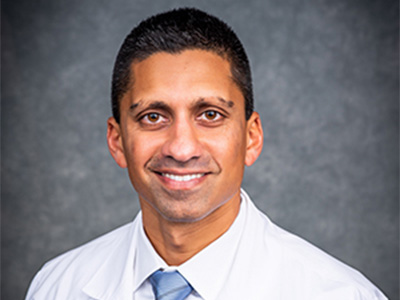 On Monday evening, Buffalo Bills safety Damar Hamlin suffered a major cardiac event after making a tackle during their game against the Cincinnati Bengals.
On Monday evening, Buffalo Bills safety Damar Hamlin suffered a major cardiac event after making a tackle during their game against the Cincinnati Bengals.
“Damar Hamlin suffered a cardiac arrest following a hit in our game versus the Bengals. His heartbeat was restored on the field and he was transferred to the UC Medical Center for further testing and treatment,” the Bills said in a statement released early Tuesday. “He is currently sedated and listed in critical condition.”
Read moreAsk a Primary Care Provider: December Recap
 It’s the last Ask a Provider recap of the year and the UAB Department of Family and Community Medicine is wishing you and your family a merry Christmas and Happy New Year! In this issue, our primary care providers offer tips to prevent holiday burnout and over-exercising.
It’s the last Ask a Provider recap of the year and the UAB Department of Family and Community Medicine is wishing you and your family a merry Christmas and Happy New Year! In this issue, our primary care providers offer tips to prevent holiday burnout and over-exercising.
CU2RE Student Q&A
 Over the past two years, the UAB Department of Family and Community Medicine has accepted over 20 medical students into the Comprehensive Urban Underserved and Rural Experience program (CU2RE). This program helps to prepare medical students interested in serving underserved areas as primary care doctors.
Over the past two years, the UAB Department of Family and Community Medicine has accepted over 20 medical students into the Comprehensive Urban Underserved and Rural Experience program (CU2RE). This program helps to prepare medical students interested in serving underserved areas as primary care doctors.
Ask a Primary Care Provider: November Recap
 Last month, the Department of Family and Community Medicine asked its primary care providers timely questions about common health issues. Check out what they had to say.
Last month, the Department of Family and Community Medicine asked its primary care providers timely questions about common health issues. Check out what they had to say.
CU2RE Pipeline Program Inspires Undergraduates to Consider Primary Care

“I 100% want to be a doctor. I have always wanted to be a doctor.”
Read more13 Family Medicine Providers Receive 2022 Patient Experience Excellence Awards
Thirteen providers in the UAB Department of Family and Community Medicine were honored for providing outstanding patient care in 2022 and will receive a Patient Experience Excellence Award from UAB Medicine.
The award recognizes UAB providers who score an average of 95% or higher in patient care satisfaction rankings and who achieve top scores on the following metrics:
Read moreUAB Primary Care Providers Push Diabetes Prevention, Management and Awareness

According to the American Diabetes Association, an estimated 37 million Americans have diabetes. An additional 96 million Americans, or one in four, have prediabetes. Even so, with the right strategies and support, diabetes can be prevented or successfully managed.
Read moreA Dietitian's Perspective: Cooking and Eating Simple, Healthy Food
Many people know that our meal choices affect many different aspects of our health. Sometimes, however, finding time to plan and make a healthy meal can be challenging. That’s Tori Faught, M.S., R.D.N., L.D. why Registered Dietitian Nutritionist Tori Faught, M.S., R.D.N., L.D., at the UAB Department of Family and Community Medicine has been featuring simple and healthy meal and snack ideas on the UAB Department of Family and Community Medicine’s Instagram page.
Tori Faught, M.S., R.D.N., L.D. why Registered Dietitian Nutritionist Tori Faught, M.S., R.D.N., L.D., at the UAB Department of Family and Community Medicine has been featuring simple and healthy meal and snack ideas on the UAB Department of Family and Community Medicine’s Instagram page.
The CU2RE Longitudinal Primary Care Pipeline Program is Now Accepting Applications from Undergraduates
Now in its second year, the Comprehensive Urban Underserved and Rural Experience (CU2RE) Longitudinal Primary Care Pipeline Program is accepting applications from undergraduate students who are interested in applying to medical school and providing health care in underserved areas.
Read moreAsk a Primary Care Provider: October Recap
Retired NFL players receive free health screenings at UAB clinic
 Former NFL player and Crimson Tide legend Antonio Langham has his blood pressure measured at the Living Heart Foundation event at UAB's Highland clinic.
Former NFL player and Crimson Tide legend Antonio Langham has his blood pressure measured at the Living Heart Foundation event at UAB's Highland clinic.
At UAB Hospital Highlands, former NFL player Antonio Langham relaxes in an exam chair as he awaits a hearing test. As President of the Birmingham chapter of the NFL Players’ Association, he says many players often avoid putting themselves in this position.
Read moreUAB Sports & Exercise Medicine provides medical coverage to largest youth sporting event in Alabama history
The world of soccer is immensely growing in the state of Alabama and with the exposure of professional teams like the Birmingham Legion, Central Alabama youth soccer associations are expanding more than ever.
The Birmingham United Soccer Association (BUSA) recently hosted the largest youth sporting event in Alabama history, entitled “Birmingham Bash 2022.” This youth soccer tournament is held annually by BUSA, running for 15 years consecutively. The event lasted three days, beginning Friday, Sept. 23 and finishing on Sunday, Sept. 25.
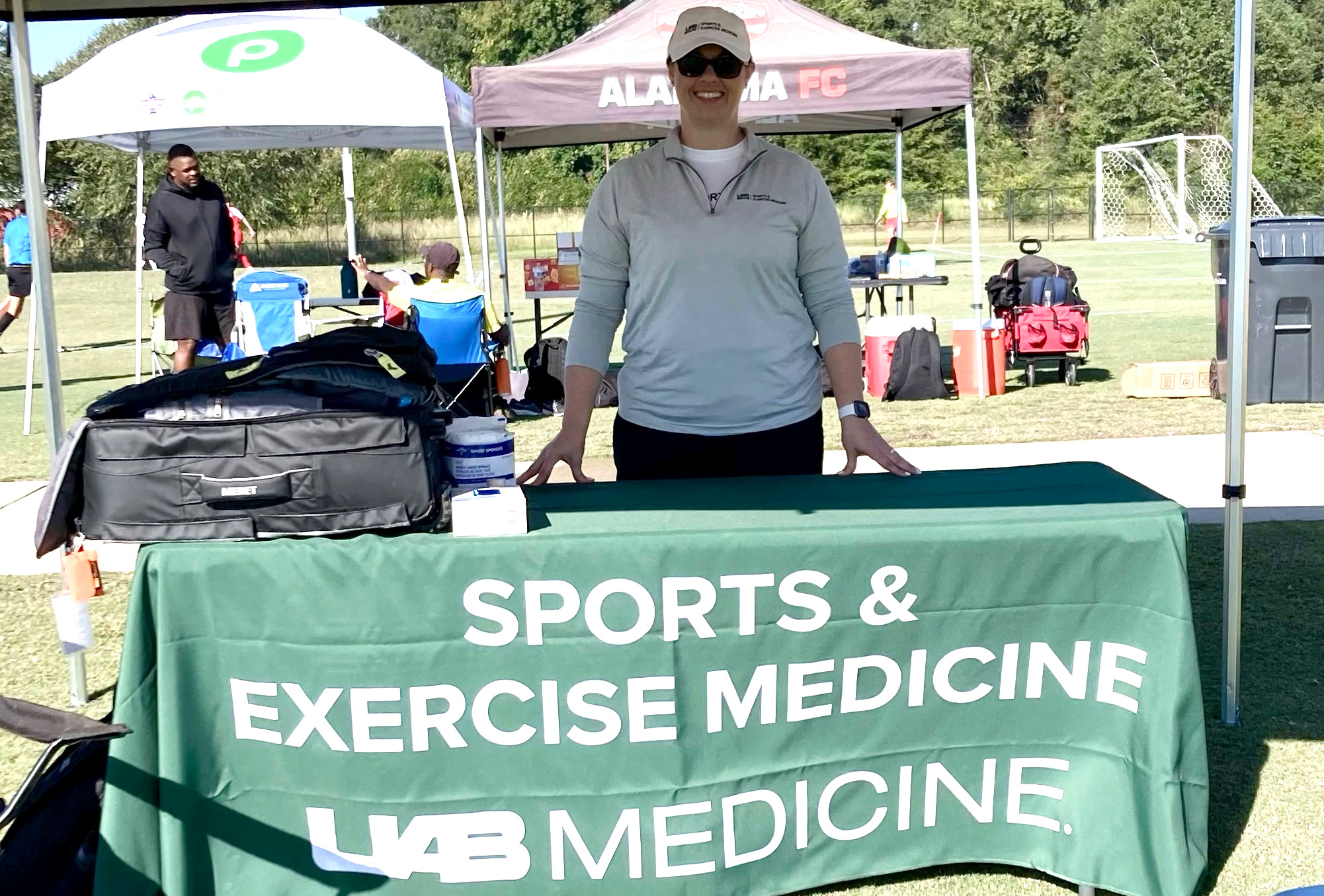 Megan Steirer, MA, LAT, ATC, was part of the UAB Sports and Exercise team that covered the BUSA Birmingham Bash 2022.
Megan Steirer, MA, LAT, ATC, was part of the UAB Sports and Exercise team that covered the BUSA Birmingham Bash 2022.
Ask a Primary Care Provider: September Recap

Primary care and family medicine physicians can help with any number of the illnesses that plague us, including aches, pains, common illness and fatigue. This month, the UAB Department of Family and Community Medicine providers discussed how to relieve and prevent common ailments for the department's Ask a Provider series.
What should I do if I consistently get headaches?
Though common, headaches are uncomfortable and can be a chronic occurrence for some. Assistant Professor and CU2RE Urban Underserved and Rural Pathways Director Jill Marsh, M.D., recommended trying different options depending on each person's symptoms and experience.
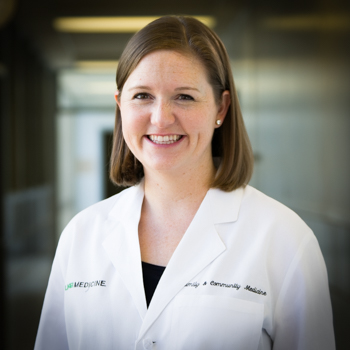 Jill Marsh, M.D.Marsh said that a doctor should help anyone suffering headaches if they also have high blood pressure (>140>90) simultaneously.
Jill Marsh, M.D.Marsh said that a doctor should help anyone suffering headaches if they also have high blood pressure (>140>90) simultaneously.
For those who aren't experiencing high blood pressure with a less severe headache, Marsh said other lifestyle factors could be the culprit.
“Are you well-hydrated? Drinking too much caffeine? How's your sleep? Do you snore? Have you been experiencing increased stress lately?” Marsh queried. “If the headaches are mild and typically resolve with Tylenol or ibuprofen, consider these factors and adjust if possible.”
Marsh recommended a doctor's visit for those whose headaches are more severely affecting their quality of life.
“If the headaches are more frequent, more severe, or are associated with symptoms like vision changes, dizziness, nausea, etc., it's really best to schedule an appointment with your doctor to discuss further!” Marsh advised.
What vaccinations should I get as an adult?
Assistant Professor Sumayah Abed, M.D., was recently featured in a UAB News article discussing adult vaccinations. There, Abed told readers that adult vaccinations are important but should be discussed with a doctor first.
 Sumayah Abed, M.D.“Vaccines are safe and effective,” Abed said. “However, depending on the type of vaccine and health conditions of the recipients, some vaccines may not be recommended for everyone. That is why it is important to speak with your health care provider about your specific needs to determine the best vaccines for you.”
Sumayah Abed, M.D.“Vaccines are safe and effective,” Abed said. “However, depending on the type of vaccine and health conditions of the recipients, some vaccines may not be recommended for everyone. That is why it is important to speak with your health care provider about your specific needs to determine the best vaccines for you.”
Abed also commented on some potential vaccines for pregnant mothers or mothers with young infants. Abed said the COVID-19 vaccine in pregnant women can help their unborn children as well.
“Pregnant women are more liable for severe illness if they get COVID-19,” Abed said. “Evidence suggests that the immunity pregnant women get from the vaccine can cross to their babies through the placenta and give them protection in the first six months of life.”
Additionally, Abed recommended that a baby’s close contacts receive the tetanus, diphtheria, and pertussis (Tdap) vaccine if needed to lower the child’s risk of catching whooping cough.
“We encourage women to get a Tdap vaccine while they are pregnant or immediately after giving birth to help protect themselves and their infant. Caregivers who will be around the baby and have not already had a whooping cough booster shot should also get vaccinated,” said Abed.
Lastly, Abed says vaccination documentation, which can be found through a person’s primary care provider, is very useful.
“It is important to keep personal vaccination records saved for travel, work and school registration,” Abed said. “The best way to discover your immunization status is to ask your primary care physician.”
Why am I always tired even though I get plenty of sleep?
It is common to feel exhausted in a busy world, but it isn’t always because of a lack of sleep. Kaylee Crockett, Ph.D., assistant professor, clinical health psychologist and clinical scientist, explained that someone’s fatigue could be explained by other factors if the person is getting enough high-quality sleep.
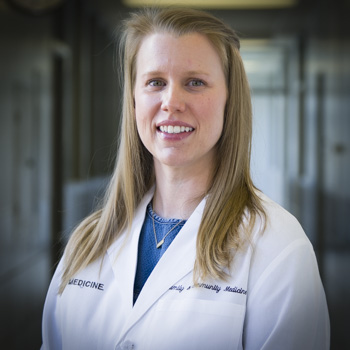 Kaylee Crockett, Ph.D.Lifestyle choices such as diet and not getting enough exercise are just a few factors that could be producing fatigue, she said.
Kaylee Crockett, Ph.D.Lifestyle choices such as diet and not getting enough exercise are just a few factors that could be producing fatigue, she said.
“Someone may feel tired if their daily diet is not balanced and they are not getting the nutrients they need, they are being overly sedentary, or they overuse alcohol or other substances,” Crockett said. “Other major causes of fatigue include medications, recent illness or infection, chronic health conditions, hormonal changes, and vitamin deficiencies.”
Crockett also identified possible remedies for what she said is another fatigue producer - stress.
“If stress seems to be a likely cause, then finding strategies to take care of yourself, reducing demands if able, seeking social support from family or friends, or seeking a referral for a behavioral health expert might help,” Crockett explained.
She urges people to see a doctor if they don’t believe any of these reasons are responsible for their fatigue.
What can I do to limit premenstrual syndrome (PMS) symptoms?
UAB Hospital-Highlands Medical Director and Assistant Professor Erin DeLaney, M.D., talked about the impact of premenstrual disorders and how to mitigate symptoms.
 Erin DeLaney, M.D.“Up to 12% of women are affected by a premenstrual disorder, which includes premenstrual syndrome (PMS) and premenstrual dysphoric disorder (PMDD),” DeLaney said. “Relieving symptoms and minimizing impairment are the goals of treatment.”
Erin DeLaney, M.D.“Up to 12% of women are affected by a premenstrual disorder, which includes premenstrual syndrome (PMS) and premenstrual dysphoric disorder (PMDD),” DeLaney said. “Relieving symptoms and minimizing impairment are the goals of treatment.”
DeLaney suggested relieving stress and making exercise a daily habit for women who are not experiencing severe symptoms but would like some relief.
“Calcium supplementation of 1000-1200 mg a day can also help improve symptoms,” DeLaney noted. “There are also several other general measures to consider in ameliorating and preventing symptoms such as drinking at least 6-8 cups of water a day, getting at least 7-8 hours of sleep a night, and taking anti-inflammatory medications (ibuprofen, naproxen, etc.) for pain if tolerated when needed.”
DeLaney recommended that women who experience harsher symptoms learn about other treatments that could help them from their professional that practices primary care health.
The Ask a Provider social media series posts every Friday with more answers to questions about common health-related issues. Never miss a post by following the department on Instagram, Facebook, Twitter and LinkedIn!
With Another Grant Renewal to Its Name, Alabama AHEC Continues Its Mission of Expanding the State’s Health Care Workforce
The teenager, growing up in rural Alabama, who sees the need for more health care in their hometown and wants to help.
 A map of Alabama AHEC's regional coverage areas.
A map of Alabama AHEC's regional coverage areas.
The college student, studying and working all day and dreaming of medical school.
The nurses, advanced practice practitioners and physicians who could use more resources to grow the practice and help their patients.
The communities around the state who need health care workers to fill a void, to make longer, healthier lives possible.
All of them benefit from the Alabama Statewide Area Health Education Centers, or Alabama AHEC, a statewide organization dedicated to recruiting, training and retaining Alabama health care professionals while also increasing diversity among health professionals and improving health care coverage and delivery in rural and underserved areas.
Based out of UAB’s Department of Family and Community Medicine and with five regional centers covering all areas of the state, Alabama AHEC is partially funded by the Health Resources and Services Administration (HRSA), which renewed the organization’s grant this summer, totaling around $1.4 million in annual funding. This month, Alabama AHEC, in partnership with Connection Health, also received a notice of award the HRSA Community Health Worker Training grant, which will award $2,999,905 to support community health workers.
The grant renewal and additional grant funding, Alabama AHEC Associate Director Becky Reamey said, validated the AHEC team’s efforts around the state and will spur the organization onward.
“This funding enables us to do meaningful and much-needed work around the state,” Reamey said. “Our entire team is excited to continue and grow our efforts to meet Alabamians’ health care needs.”
Among the organization’s programs is the AHEC Scholars program, a longitudinal, interprofessional education program that provides free didactic and community-based training for more than 400 students, including medical, nursing, dental, pharmacy, social work, public health and nutrition students. The program includes about 40 total hours of curriculum and aims to connect students across health professions, building their skills and encouraging them to serve in medically underserved communities.
In 2020 and 2021, the Alabama AHEC Scholars were also active participants in the organization’s efforts to fight COVID-19, including testing and vaccination clinics and education. Through this program they received additional training in mental health first aid.
Maria-Camila Ochoa, a University of South Alabama medical student and AHEC Scholars alumna, said the program gave her “the tools and experiences to best serve rural and underrepresented communities as a physician.”
“I pursued a career in medicine to serve those who are underrepresented in our health system, and the AHEC Scholars program has provided me with the funds, support and information to better accomplish this goal,” Ochoa said.
Alabama AHEC also offers pipeline programming for high school and college students. In 2021, 12,460 students participated in those programs, which help recruit students into health care careers and support them in pursuing post-secondary education. Among others, these programs include the Health Professions Academy hosted by West Central Alabama AHEC; Camp LEAP, a five-day summer enrichment program; Career and Professional Enrichment (CAPE) and Health Career 101 for high school students; as well as Discovery MedCamp, held on the campus of Auburn University this summer.
Students also benefit from a Community-Based Educational Training program that pairs them with health care providers for clinical rotations, focused on underserved areas or areas experiencing health care shortages.
In addition to serving students and aspiring health care professionals, Alabama AHEC also manages numerous community outreach programs. North Alabama AHEC, for example, runs an HIV screening program that conducted more than 200 screenings even during the COVID-19 pandemic. The regional center also runs a Youth Service Zone, which pairs young volunteers with community projects to encourage lifelong service.
 A group of AHEC Scholars and volunteers at a COVID-19 testing and vaccination event. (photos provided by the Southern Alabama AHEC)
A group of AHEC Scholars and volunteers at a COVID-19 testing and vaccination event. (photos provided by the Southern Alabama AHEC)
East Central Alabama AHEC runs Remote Area Medical (RAM) clinics, which saw more than 612 patients in 612, with services provided by 450 volunteers. South East Alabama AHEC runs a health literacy program, teaching citizens strategies for communicating with their health care providers, and a Health Disparities program that helped bring COVID-19 testing to community events, daycares, schools, shelters, churches, employers and county jails, among other locations.
West Central Alabama AHEC also has a large program focused on opioid abuse, the Rural Communities Opioid Response Program. Focused on six Alabama counties, that program provided education and training for community members, built an early intervention and treatment toolkit for health care professionals and supports a community recovery program. The program also increased access to naloxone in rural service areas to help prevent fatal overdoses, and established a drug takeback program to safely dispose of unused medications.
Each of these programs supports AHEC’s overall mission of building up Alabama’s health care workforce and providing care to the communities that need it most. With this year’s grant renewal, the organization will be able to continue and grow that mission, helping the state meet new challenges and plan for a healthier future.
Maycock Discusses Career, Advice on Dean's Excellence Award Panel

a six-member panel of women 2022 Dean’s Excellence Award winners. The American Medical Women’s Association (AMWA)’s chapter at the Heersink School of Medicine hosted this panel in August 2022 as the second part of a two-part series featuring almost all the women who won this award.
Maycock, who won a 2022 Dean’s Excellence Award in Service, spoke about her many accomplishments at UAB since her arrival at Selma in 2017.
Selma hospital Vaughan Regional Medical Center has most of its inpatients under the care of Maycock and her residents, Louis Lambiase, M.D., regional dean of the UAB Montgomery Regional Medical Campus, noted in his remarks. Lambiase nominated Maycock for the Dean’s Excellence Award.
The hospital’s CEO also had high praise for Maycock. “The CEO of Vaughan Regional Medical Center also commented that his hospital would fold without our program, and it’s probably true,” Maycock said, and chuckled. “We take care of the vast majority of the inpatients in the hospital.”
COVID-19 was also a tremendous challenge for Maycock and her team, with the challenges of the pandemic, some faculty turnover and an increase in patient load, stressing an already stressed system.
“At the peak of the pandemic, it wasn’t uncommon for us to see 50, 60, almost 70 hospitalized patients a day,” Maycock noted. “It was unreal.”
To make sure all the patients received care, Maycock supervised residents in the hospital, clinic, three nursing homes and on home visits. Maycock also established UAB Selma’s hospitalist fellowship program and an ICU elective to help meet the needs. Even with this help, however, Maycock said she racked up almost quadruple “the annual average work RVU production for family physicians during the 2020 - 2021 year.”
Another one of Maycock’s responsibilities is bringing new residents into the UAB Selma Family Medicine residency, one of the country's few truly rural residency programs.
“Rural hospitalists are very rare,” Maycock said. “[Hospitalists are] not used to having to manage the type of patients that we have to manage here. They’re not used to having to do the type of procedures that we have to do here.” Still, the program currently has 16 residents, all now immersed in the opportunities and challenges of rural practice.
In addition, Maycock said that 11 residents who finished the Selma residency program under Maycock work in Alabama or Selma currently. This fact is significant for Alabama, as the state faces a critical shortage of primary care providers.
Outside of the hospital, Maycock also loves serving the community through initiatives like health fairs. Maycock has worked hard to improve Selma’s free clinic offerings and to connect the program to Selma through creating a “community chair resident leadership position” as well.
 Maycock (fourth from left) celebrates Graduate Medical Education Professionals Day.Maycock said the advice she gives to medical students and residents is that life can be unpredictable, so they should never pass up learning new things “This is a time for you to gather as many tools as you can because you don’t know where life is going to lead you,” Maycock remarked.
Maycock (fourth from left) celebrates Graduate Medical Education Professionals Day.Maycock said the advice she gives to medical students and residents is that life can be unpredictable, so they should never pass up learning new things “This is a time for you to gather as many tools as you can because you don’t know where life is going to lead you,” Maycock remarked.
Maycock advised others to praise God with their work as this is something she practices. “I view my work as a calling, and I work for the glory of the Caller and rather than for myself, and so that’s my motivation,” she explained. “Whatever you do, do it all for the glory of God.”
UAB Medicine Assistant Dean of Professional Development Sandra Frazier, M.D., spoke up during the call to show her amazement at Maycock’s devotion and perseverance in Selma.
“I’m exhausted just listening to what she’s doing. I don’t know how she’s still standing,” Frazier said. “I’m so impressed because she has such a servant’s heart. She is the epitome of service. She could go anywhere, but she chooses to stay in Selma, which is a very difficult place to provide healthcare and to recruit people, and she keeps soldiering on.”
In addition to Maycock, Cristin Gavin, Ph.D., Megan Hayes, Ph.D., Kelly Hyndman, Ph.D., Nita Limdi, Pharm.D., Ph.D., MSPH, and Teresa Wilborn, Pharm.D., Ph.D., also shared their accomplishments working in the medical field at UAB. All were Dean’s Excellence Award Winners in 2022.
AMWA chapter president and panel leader Marisa Marques, M.D., said a goal of this event was to hear how each woman won their awards, have them discuss their excellent work and normalize those kinds of conversations.
“More than 70% of the award winners were women,” Dr. Marques said. ‘I thought that was an important milestone.”
To view the entire discussion and watch the first part of the series, click here.
UAB Sports and Exercise Medicine Promotes Healthy Habits through Soccer Club Partnership
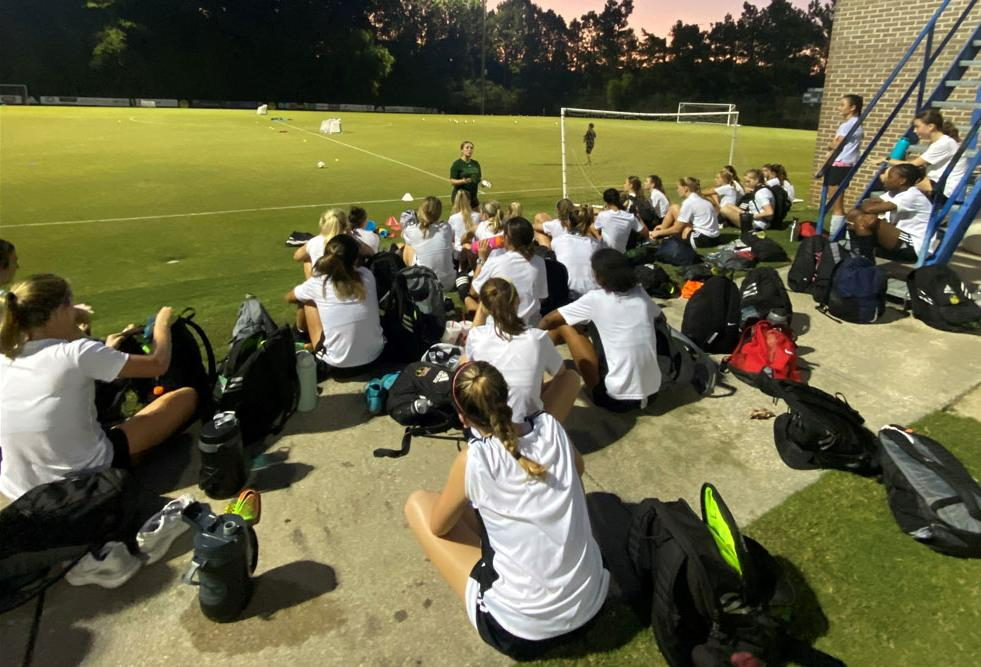 Faught, center, leads a nutrition discussion with players after practice.
Faught, center, leads a nutrition discussion with players after practice.
The team at UAB Sports and Exercise Medicine, a partnership between the departments of Family and Community Medicine and Orthopaedics, is setting up student athletes for a lifetime of healthy habits with a new, nutrition-centered educational program for teens and young adults.
Dietitian and recent UAB addition, Tori Faught MS, RDN, LD teamed up with Hoover-Vestavia Soccer Club (HVS) to launch the pilot program in August.
Executive Director of Vestavia Hills Soccer Club Rocky Harmon says he is always looking for ways to improve the program. Boasting more than three decades of club soccer experience, including 15 years in his current position, Harmon is confident in his expertise; but he is also aware of his limitations.
“I know what I don’t know,” said Harmon.
That is why Harmon looked to outside professionals to elevate his soccer program-- professionals like Faught. UAB Sports and Exercise Medicine already provides care for the club’s athletes, sponsors jerseys and, since October 2021, holds weekly health checks. Trainer Kenny Davis is on-site Mondays, when any HVS player with injuries or issues can seek rehab or treatment.
Harmon tells us the program’s success precipitated the new nutrition program.
“Kenny was the conduit,” he said.
Every other week, young adults take home key lessons in performance nutrition, including how to stay hydrated and what to eat to help sore muscles recover.
“Once athletes reach the college or professional level, they’ve already been exposed to basic performance nutrition principles from a credible source using evidence-based recommendations and have started to form better fueling and hydration habits,” said Faught. “It’s all about protecting the athlete from false nutrition advice. Starting sports nutrition education in this age group is good because they are already being exposed to false nutrition advice from uncredible, ill-informed sources and are forming habits and beliefs based off this information."
Faught says teens, ages 14-18, are “responsive.” She says the team talks allow her to address a number of topics and to build a rapport with the athletes.
Faught explains younger students may not be able to grasp all of the concepts she currently covers. She tells us older students not only pay better attention, but they also face greater challenges. For example, in one of her most recent talks, Faught introduced the topic of dietary supplements to students, in an effort to warn them of the risks.
“You cannot out-supplement a bad diet,” she said.
Faught says there is increased pressure to subscribe to the purported benefits of popular supplements. According to an article in American Journal of Health Education, young people are “one of the largest target audience groups” for performance-enhancing dietary supplements because of their interest. In turn, the market has responded by “[enticing] this vulnerable population and [making] it easy for them to engage in unregulated consumption.”
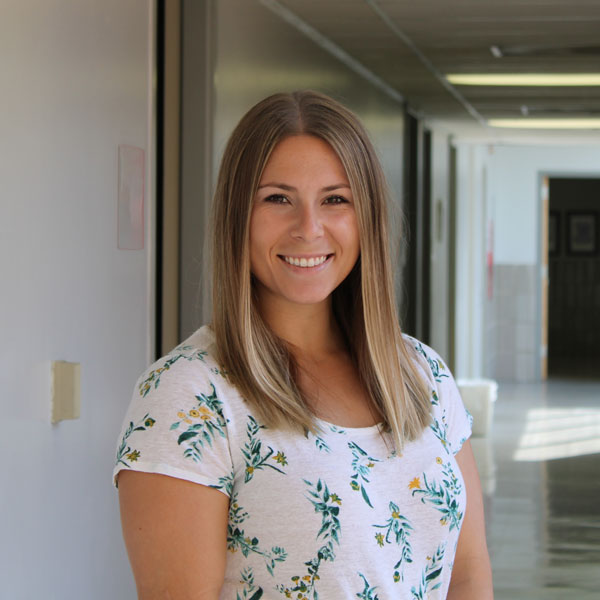 Tori Faught, M.S., RDN, LD
Tori Faught, M.S., RDN, LD
What’s more, many supplements that claim to boost performance or speed up muscle recovery are not allowed in collegiate athletics. Celsius and Alani energy drinks, for instance, are sold in many grocery stores, but if you drink one as a college athlete, you are risking your eligibility. Both contain Guarana, a form of caffeine currently banned by the NCAA.
“You don’t want them to get hooked on a supplement now that would put them at a high risk for testing positive for banned substances in the professional or collegiate setting,” Faught explained.
Aside from dietary supplements, research reveals student athletes are also at greater risk for malnutrition. According to the National Library of Medicine this is because “their bodies are attempting to balance their increased needs for growth and training at the same time.” In addition, those studies show these competitive high schoolers are at greater risk for disordered eating than their peers. The article, “Nutritional Risks Among Adolescent Athletes with Disordered Eating,” reveals, “despite their high nutritional requirements, athletes often engage in inappropriate dietary strategies in their attempt to regulate their body weight and/or body shape, for the purpose of reaching optimal sports performance or ideal physical standards for their sport.”
“The smallest change in diet or hydration can make a big difference in performance,” said Faught.
Faught hopes the simple and informative meetings with the boys and girls soccer teams will give student athletes the practical tools they need to improve their performance and to reduce sports-related injuries. Her goal is to, eventually, expand the program to also include younger HVS athletes, and Harmon is on board. He calls these nutritional talks a success, so far.
From Faught’s educational discussions to the care provided during tournaments and games, Harmon tells us the support UAB Sports and Exercise Medicine offers HVS teams gives them an advantage on and off the field.
Ask a Primary Care Provider: August Recap

Discover advice about donating blood, consuming caffeine and more from UAB Department of Family and Community Medicine providers this month.
“I heard there is a severe blood shortage right now. How do I know if I am eligible to give blood?”
Assistant professor Sumayah Abed, M.D., explained how it important it is to consider donating blood right now, and how to know who can give blood.
 Sumayah Abed, M.D.
Sumayah Abed, M.D.
Abed noted that The American Red Cross, which supplies 40% of U.S. hospital blood, announced that the coronavirus caused a severe blood shortage for the organization. Unfortunately, Abed stated that America is trying to handle this shortage in a country where blood is needed every other second, and blood transfusions are becoming more common.
“There is an increasing demand for blood transfusions for patients suffering from cancer, blood diseases like sickle cell anemia, physical trauma, and complications of pregnancy and delivery,” Abed said.
Not only does blood donation help the sick, Abed mentioned it could benefit the donor as well.
“Studies show that donating blood on a regular basis may protect against cardiovascular disease by lowering total cholesterol and low-density lipoprotein levels. Other studies found that blood donation is linked to improved mental health and donors grow closer to their communities,” explained Abed.
Abed noted that anyone healthy who weighs at or above 110 pounds and is at least 16 can donate blood.
“What guidelines should I follow for consuming caffeine in a healthy way?”
 Caroline Cohen, Ph.D., R.D., L.D.
Caroline Cohen, Ph.D., R.D., L.D.
Caffeine is a popular ingredient in many drinks and foods that Americans consume. Still, since it can cause adverse as well as positive health effects, assistant professor Caroline Cohen, Ph.D., R.D., L.D., recommends using it in moderation.
"Abundant research evidence supports caffeine's positive effects on sports performance, especially in endurance activities; it also improves reaction time and concentration. In addition, it can provide relief from migraine and headaches," Cohen explained. "However, its drawbacks include gastric distress, sleep disruption, anxiety/nervousness and increased blood pressure."
To do this, she recommends that adults drink no more than 400 milligrams of caffeine daily and half of this amount for pregnant women. Since Cohen mentioned the average brewed cup of coffee has 160 milligrams of caffeine and energy drinks can have more than 200 milligrams, most people should limit their consumption to just one or two a day.
In addition to these drinks, Cohen mentioned that several other everyday items also contain caffeine. "Remember that chocolate, coffee-flavored items (like ice cream!), pain medications and some energy bars may also contain small amounts of caffeine."
Cohen advises teens and children to avoid caffeine, which can hurt their sleep schedule.
“What is a simple, healthy snack to make when I have a sweet tooth?”
 Tori Faught, M.S., RDN
Tori Faught, M.S., RDN
It is often difficult to choose healthier snacks as opposed to less nutritious foods when hunger strikes. Fortunately, registered dietitian nutritionist Tori Faught, M.S., R.D.N., showed us how to make a quick, 5-ingredient fruit smoothie from a recipe at myplate.gov.
This simple smoothie is as easy as blending yogurt, milk, strawberries and banana together in a blender. Faught also added ice as a personal preference. This smoothie is great as an after-school snack, dessert or as part of a healthy breakfast.
Click here to see the full recipe.
For more advice from our providers, please check our social media every Friday for a new Ask a Provider post.
Written by Ann Marie Stephens, Communications Intern
CU2RE Program Awarded $5.5 Million in HRSA Supplemental Funding

The Department of Family and Community Medicine’s Comprehensive Urban Underserved and Rural Experience program, or CU2RE, has been awarded supplemental funding from the Health Resources and Services Administration for the second year in a row, with new funding totaling $5.5 million.
The program began in 2020 with a $7 million HRSA award supporting its mission to enhance the recruitment, training and retention of medical students dedicated to providing primary care in rural and urban underserved areas, especially in Alabama. An additional $5.2 million in supplemental funding boosted the program in 2021, plus this recent award brings the funding total to $17.7 million.
The CU2RE program has grown rapidly since its launch in 2020. Its medical student program grew from an inaugural cohort of eight students to a second cohort of 14 students including students from all of UAB’s regional campuses. Applications for the third cohort, which will begin the program in January, are now open to first-year Heersink School of Medicine students. These students benefit from early clinical experiences, one-on-one mentorship with primary care faculty, an immersive summer program with stipend support, hands-on procedures workshops, discussions focused on leadership, cultural competency and other skills, primary care research opportunities and much more. (Read more about the CU2RE program’s impact on medical students here.)
The program has also added a CU2RE pipeline program for college students interested in practicing primary care in underserved areas. That program launched this summer, welcoming 12 students from five Alabama universities. Those students have already benefited from in-person and online workshops and discussion sessions, a tour of UAB medical facilities, discussions with faculty members and events with medical students in the CU2RE program.
In addition to programming for students, the CU2RE program supports training and practice transformation efforts for faculty members and clinicians as well as research efforts that bridge education and clinical practice, tackling some of Alabama’s toughest health care challenges.
Among other things, the new HRSA supplemental funding will be used to increase educational activities for medical students, redesign family medicine education across all UAB regional campuses, provide students with stipends to offset medical education costs and implement new faculty, staff and student development initiatives.
“It has been so exciting to watch the CU2RE program grow since its launch and the new supplemental funding from HRSA will give us even more opportunities to expand the program’s impact,” said Irfan Asif, M.D., department chair and associate dean for primary care and rural health. “Growing and enhancing primary care in Alabama is an important health care priority for the state, and I am thankful for HRSA’s investment in our efforts and our future physicians.”
Special Program for First-Year Medical Students Interested in Primary Care in Underserved Areas Opens Applications for Third Cohort

First-year medical students interested in health equity and serving others now have the chance to get early clinical experience-- and many other resources-- in a program specifically designed to support aspiring physicians who are eager to work in underserved areas.
The Department of Family and Community Medicine is currently accepting applications for its Comprehensive Urban Underserved and Rural Experience, or CU2RE program. CU2RE aims to enhance the recruitment, training, and retention of medical students interested in providing primary care in rural and urban underserved areas of Alabama and beyond.
“CU2RE has sharpened the edges of real clinical experience and brought the idea of practicing in an urban underserved area into greater focus. It has encouraged me to lean into the stories of patients I see in clinic and the underlying factors that have led them to [the clinic],” one CU2RE student stated.
The program has welcomed two cohorts of medical students-- eight in 2020 and 14 in 2021. First-year medical students from any of UAB’s four campuses are currently welcome to apply; the deadline is September 12. So far, feedback from students indicates the curriculum is doing its job. Based on an anonymous survey, participating students are deepening their interest in primary care, receiving excellent support from mentors and fellow students, and have felt very well-prepared for clinical patient care.
Program participants choose whether to practice in a rural or an underserved urban area, but they all focus on the same six core elements -- social determinants of health, telehealth, behavioral health, interprofessional education, cultural and linguistic competency, and practice transformation.
 Students in the second cohort of the program visited the National Memorial for Peace and Justice in Montgomery during their summer program.
Students in the second cohort of the program visited the National Memorial for Peace and Justice in Montgomery during their summer program.
“It has been an opportunity to strengthen clinical skills and learn how to incorporate social factors into encounters to see the bigger picture of the patient,” wrote one CU2RE student.
First year medical students receive early clinical experience, consistent mentorship from a primary care faculty member, and participate in service learning. They say an early introduction to clinical patient care has them primed for a career in primary care.
“I do not know another group or set of students that will have this experience moving forward. I wish I could do more for my patients, but I think even talking with them and talking about their needs has allowed me to grow immensely in my future practice,” a CU2RE student wrote.
CU2RE students also have extra resources and learning tools. During students’ first two years, they meet for monthly discussions regarding online modules and assignments. Additionally, with the help of research faculty, students complete a scholarly project that counts towards their scholarly activity requirement. They also have access to the Alabama Practice Based Research Network based out of the Department of Family and Community Medicine.
Organizers say one of the most valuable parts of the program is the patient panel, which offers students the opportunity to serve as health coaches for primary care patients. It allows participating students to “develop personal relationships with patients who represent varied points across the lifespan, to understand common medical conditions that might occur throughout a patient’s life, and to appreciate the concepts of disease prevention and population health.” With the ability to monitor these patients throughout their medical school career, students are able to act as their health advocate and play an integral role in their health care.
CU2RE coordinators look to go beyond graduating more quality primary care physicians. Part of the program’s purpose is to “develop students to enter primary care as leaders in their communities and profession.” One common thread in their summer programming and semi-annual retreats is personal and professional development. For example, they discuss leadership styles, values, biases, and the importance of emotional intelligence.
The program launched in 2020 after the Health Resources and Services Administration (HRSA) awarded UAB with a $7 million grant to address the primary care physician shortage in Alabama. A state map from the Health Resources and Services Administration reveals there are too few doctors in 62 of Alabama’s 67 counties. That is nearly 93%.
In the CU2RE proposal abstract for HRSA, UAB’s Heersink School of Medicine says this about the project:
“The scope and depth of these experiences will solidify the family medicine identity” as well as inspire student and preceptor “dedication to family practice in medically underserved communities in Alabama.”
According to Irfan Asif, M.D., chair of the Department of Family and Community Medicine and Associate Dean for Primary Care and Rural Health, Alabama needs “more than 600 additional primary care providers to meet the needs of the patients and the kinds of health conditions that we’ll be seeing by 2030.” That is why Asif insists the way to address the deficit is to “be aggressive in the family medicine and primary care programming that we develop and implement.” That is what CU2RE is all about.
First-year medical students interested in the program can learn more and begin their application here.
Ask a Primary Care Provider: July Recap

Throughout July, Department of Family and Community Medicine primary care doctors answered questions about preventing exercise-related injuries, losing weight, having difficulty sleeping and more through the department’s social media.
Read more